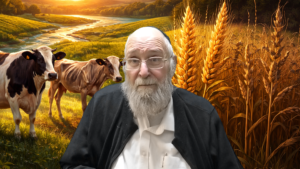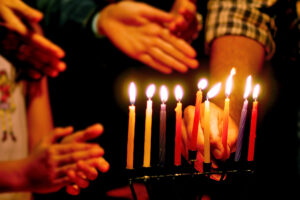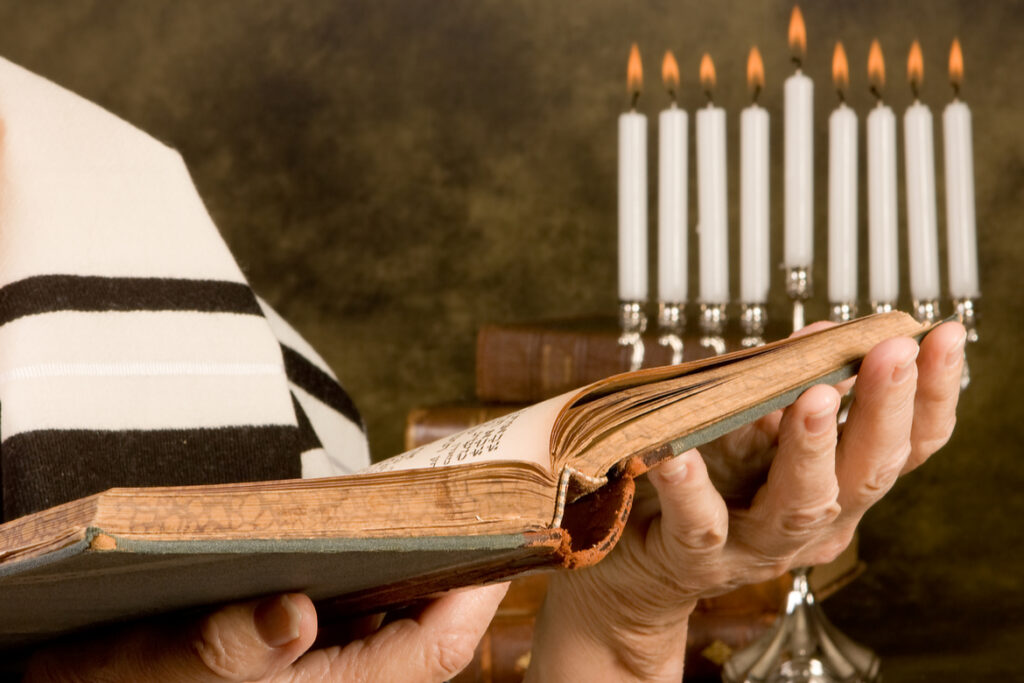- Faith ⬦ Read ⬦ Shabbat ⬦ Weekly Torah Portion
A Mishkan (Tabernacle) made up of Good Points – Parshat Trumah
“A little light repels a lot of darkness.” This well-known saying can also apply to our souls. Evil actions darken the light of the soul, but the good points and the light that is in them will prevail in the end. This is the secret of the building of the Mishkan (Tabernacle) and the message of this week’s parsha. This is the message of “Azamra!” (literally meaning, “I will sing”), the lesson that Rebbe Nachman told us to always carry with us in our hearts.
This week’s parsha is parshat Trumah which tells of the very first “fundraising campaign” in history: a campaign for donations to build a dwelling-place for G-d, known as the Mishkan. The Holy One, Blessed be He, said to Moses, “Speak to the Jewish people and let them take for Me a contribution. Take My contribution from every man whose heart motivates him to give” (Exodus 25:2). Each and every person of the Nation of Israel was recruited for the fundraising campaign, and everyone came with good intentions and with his own special abilities and made a generous contribution.
G-d does not need our money. When He wanted to, G-d was able to “order” food for 600,000 people. As is recounted in parshat Beha’alotkha, suddenly large numbers of quail flew out of the sea directly into the hands of 600,000 people. So, why did G-d need the contributions of the Nation of Israel?
The answer is that this campaign began only after the Nation of Israel had sinned with the Golden Calf. A month earlier, the Nation of Israel had been at the pinnacle of spirituality, as it is written: “G-d spoke with you face to face.” And a moment later—a total collapse! What a fall! From the highest heights and from the strongest possible connection with G-d, they fell to the lowest place possible— into the Sin of the Golden Calf—which was idolatry. (The Sin of the Golden Calf occurred before the commandment to build the Mishkan, despite the fact that it is recounted in the Torah afterwards, in parshat Ki Teitzei.)
Moses begged G-d to forgive the Nation of Israel for the Sin of the Golden Calf. G-d agreed, but in order to atone for this sin, he ordered Moses to ask the Nation of Israel for donations to build the Mishkan. The donations for the Mishkan were actually an opportunity for each person to atone for the Sin of the Golden Calf.
What is the connection between this sin and making donations to the Mishkan?
One of Rebbe Nachman’s most famous lessons is called “Azamra!” (Likutei Moharan 282). In this lesson, Rebbe Nachman teaches that each person must look for and find good points in himself. Every person has a good point, even if he has sinned and done very bad things. Each person must search inside himself to reveal his internal good points. Surely, it is possible that even when he has already found some good points, he will find that he still lacking and has deficient character traits. Nevertheless, he should plumb the depths of his soul to discover the good he has in him, because how could it be that he had not done something good. No matter how unrefined his good points are or how many times he has fallen and failed, all one’s unintentional sins only affect the outer layer, and the inner part of the person remains pure and clean. The good point—no matter how many layers of “filth” are covering it—still remains clean and unblemished because its source is in G-d’s goodness and thus is eternal. In the end, all the bad will fall away and the good will remain pure and flawless, even in the face of the gravest sins. Rebbe Nachman explains the verse, “Only a little while and the wicked will be no more” (Psalms 37:10) as: once a person looks for the small amount of good that still exists in himself—that with respect to this, he is not evil—then he will be able to contemplate this good point and see that he will no longer be in the lowly place he was before. The moment that a person finds a good point in himself, he already has advanced and raised himself up to a higher level than he was previously on.
The good point—no matter how many layers of “filth” are covering it—still remains clean and unblemished because its source is in G-d’s goodness and thus is eternal. In the end, all the bad will fall away and the good will remain pure and flawless, even in the face of the gravest sins.
We shall now connect these ideas to this week’s parsha. The verse says, “I am black but beautiful” (Song of Songs 1:5). Our sages explained this as, “I am black—regarding the sin of the Golden Calf—and beautiful—regarding the building of the Mishkan.” That is to say that even if I have sinned with the Golden Calf, I can still do beautiful things like making a donation to the building of the Mishkan. According to Rebbe Nachman’s explanation, the good point shows us that the Sin of the Golden Calf—which was evil and “black”—is not mine. It was rooted in the same evil which covers up my good deeds. First, a person must reveal the inner point of good: that he is “beautiful regarding the building of the Mishkan.” As we said, one good point stands in opposition to the whole world—against all the darkness—and will be victorious over that darkness.
When Moses begged G-d to forgive the Nation of Israel for the Sin of the Golden Calf, G-d acquiesced and taught Moses the Thirteen Attributes of Mercy, which we recite on days when Slichot are said or during times of trouble in order to arouse G-d mercy upon us. G-d taught Moses the secret of searching for good points in every Jew, and Moses gathered together all these good points and then solicited the nation for donations for the work of building the Mishkan. Each and every person contributed his own good point and from this the Mishkan was built. In a different lesson (Likutei Moharan 43:8), Rebbe Nachman taught that each person has a good point which his friend does not have. The donations to the Mishkan included gold, silver, copper, techelet (blue dye), argaman (purple dye) and more, and this hints that each person has his own good point. One person shines with the aspect of gold, but others are needed who shine in the aspect of copper. Everyone has a place in the Mishkan.

G-d taught Moses the secret of searching for good points in every Jew…
A few years ago (long before the days of the Coronavirus when there were still restaurants), I went into a café in Jerusalem for a coffee. The waiter, a young man, apologized to me for the long waiting times and for not being able to serve properly due to being so busy with customers. I said to him, “I actually appreciate your ability to work under such pressure!” And I added, “It is really one of your good points.” He heard this and immediately responded: “Reish Peh Beit!” (282, referring to the number of the Rebbe Nachman’s lesson “Azamara!”). I was so surprised! But soon a time will come when such a statement won’t surprise anyone. Everyone will know about the secret of looking for good points and conquering the darkness: believing in the good that is in a person and focusing on this instead of on the negative.
It all depends on Moses, the tzaddik (righteous man) who has the ability to reveal and teach about all of the infinite good points in each person. He is able to go over this teaching again and again until everyone internalizes it so that they then will look for their inner good points and illuminate them. As Rebbe Natan wrote (regarding the lesson of “Azamra!”): “And Rebbe Nachman, may he rest in peace, warned us to take this lesson with us because it is a strong foundation for anyone who wishes to come close to G-d and not lose his place in the World to Come completely, G-d forbid. The reason that most people who are far from G-d are in such a place is due to depression and sadness. They fall into despair because they see the greatness of their faults and how they messed things up, as each person knows his own heartache and pain. And due to this, they fall into utter despair, and most of these people give up on themselves completely. And this is why they do not pray with intention at all, and they don’t even do what they are still able to accomplish in serving G-d.”
“Therefore, every person should study this lesson very much…to strengthen himself to carry this lesson in his heart and to seek and search for some goodness or good point in within himself in every situation, as mentioned above. And by doing so, he will be able to live and to find happiness. And he should still wait for salvation, that he will be able to pray and to sing and give praise to G-d in the aspect of “I will sing to G-d with all that I have.” And through this, he will merit to truly return to G-d.
(According to Likutei Halachot, Hashkamat HaBoker, 1:4)
- 0 comment






















